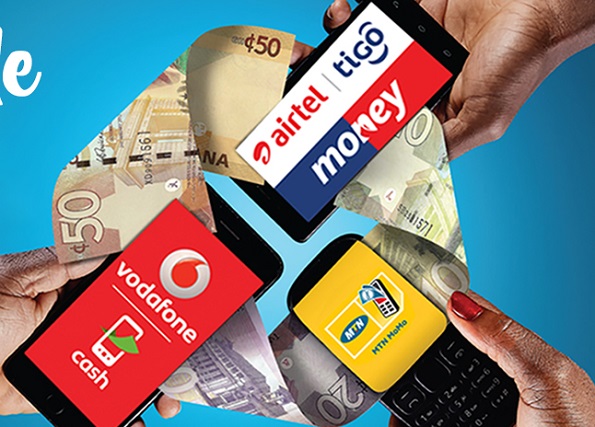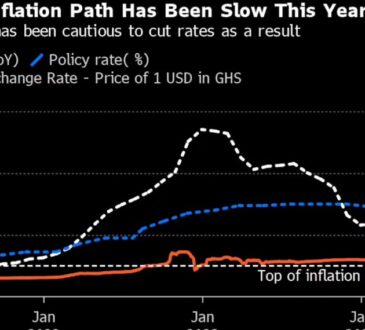
The controversial electronic transaction levy (e-levy) introduced by the Ghanaian government which has imposed a 1.5percent value tax on all electronic transactions above GH¢100 ($13; £11) took off in May with government emphasizing the need to raise revenue to pursue further developmental agenda.
With two years to finish his two-term administration, President Nana Akufo-Addo’s critics have chastised him for failing to fulfil his campaign promises leading to the 2016/2020 elections.
The current government has been struck by two major crises since taking over the West African country, the global coronavirus pandemic as well as the Russia-Ukraine War and have affected Ghana’s revenue generation.
Finance Minister Ken Ofori-Atta did not rule out the impact of the war on Ghana’s economy when he met with the media earlier in March, saying “the war in Ukraine could not have come at a worse time for the global economy.”
Mr. Ofori-Atta believes the already global efforts toward economic recovery from the devastation wreaked by the Coronavirus pandemic were being disturbed by supply chain disruptions, surging inflation, and uncertainties in the financial markets, with anticipated hikes in interest rates.
But while the government struggle to turn Ghana’s economic fortune around, authorities believe taxing electronic transaction can work some magic by helping the government generate enough revenue.
The process leading to the implementation of this levy has led to several rejection by the minority side of the nation’s legislative body as well as sections of the public.
On the first day of implementation on May 1, 2022, some customers reported cases of wrong deductions by the Ghana Revenue Authority – the implementing body. The tax authority later in a statement promised to refund every unlawful deduction to the customers – many who are still worried about how the new tax may negatively affect their business.
Ghanaian online businesses who operates in the country’s e-commerce space have seen major boost in recent times with many retail businesses and online shops conducting transactions through mobile money platform. The platform is an electronic wallet service that allows registered users to store, send and receive payments using their accounts.
It is estimated that, about 38.9 percent of Ghana’s population aged 15 years and above had a mobile money account. The share of mobile money users significantly increased from 2018 but decreased slightly compared to 2020.
Already, there are signals of people turning their backs on electronic payments with massive panic withdrawals hitting several mobile money vendors who fear they might be out of business if the trend continues.
The central bank has reported that the industry lost over US$1bn in the two months from last November as consumers started using cash ahead of the tax coming into force.
The Akufo-Addo led administration since taking over the management of the country’s economy in 2017 promised to build a digital economy with a believe that a digital economy will increase employment creation as well as reducing the stress of starting a new business.
However, social commentators have said the new tax could see a big drop in the use of mobile money services within the first few months of its implementation.
Some analysts have also argued that taxation on mobile transactions may not expand the tax base significantly but, rather, may reverse the gains on retail electronic payments and financial inclusion.
According to these analysts, a higher tax rate on low-level retail electronic transactions mostly levied on low-income earners that are sensitive to transaction costs may discourage the use of mobile phone-based transactions, incentivizing them to revert to cash transactions to evade taxes and so less tax revenue.
This trend, they say, will deal a big blow to the financial inclusion successes witnessed so far.
The government had already anticipated a drop in the use of digital money once implementation begins.
Deputy Finance Minister, John Kumah is reported to have told local media that “There will be about 24% attrition rate in the three months to six months that the tax would be introduced.
“The same research told us what should be done to bring back these people after a while, and we have all these things in place,” the minister added.
In the 2022 budget, government said it aimed to collect some GH¢6.9 billion from the levy.
But following the controversy that met its proposal, the levy was not passed in November 2021 by Parliament until March 2022.
E-levy finally takes off
The country’s revenue authority, GRA, and the three charging entities – the banks and specialised deposits-taking institutions (DFIs), the electronic money issuers (EMIs) and the telecommunications companies (telcos) – have put in place the relevant system and mechanisms for the public to start paying 1.5 per cent of the levy on daily electronic transfers above GH¢100.
So, from the beginning of this month, all electronic transfers that are done in a day and above GH¢100 will attract a 1.5 per cent levy to be remitted to the GRA to support the government fund development.
Widening the tax net
It is reckoned that more than 70 percent of Ghana’s workforce are within the informal sector of the economy and less than 10% of the population pay direct taxes.
However, management of the current economy of the country believe that the e-levy will widen the tax net and will include those in the informal sector to pay direct taxes thereby boosting the government revenue to pursue its developmental agenda.
It is estimated that last year $126 billion worth of mobile money transactions were made and the government hopes that the e-levy will raise almost $1bn this financial year.
Court injunction fails
The minority in Parliament attempt to seek for an injunction against the implementation of the e-levy failed in court as a seven-member Supreme Court panel dismissed an interlocutory injunction filed by three minority MPs seeking to halt the implementation of the levy.
In a unanimous decision the apex court held that irreparable damage will be caused to the public if the implementation of the E-Levy is put on hold and the substantive case challenging its constitutionality fails.
According to the court, in the event the substantive suit succeeds, the Ghana Revenue Authority (GRA) had the means to refund the E-Levy already paid back to the public.
However, it said if the E-Levy is put on hold and the substantive case fails, it would cause irreparable damage to the government as it cannot collect the money already lost.
“Greater hardships will be caused to the state in meeting its developmental obligation to the people, the court held.
However, the court ordered the GRA to keep records of the levy collected so far so that in the event the substantive case succeeds, it could refund the money back to the public.
The opposition National Democratic Congress members of Parliament have vowed to stop the government from going ahead with the implementation after the house passed the bill with the minority staging a walk-out.
Leading members of the party including former flagbearer, John Mahama, has promised to abolish the levy when his party which he seeks to lead in the next election wins.
A case study of other countries
As Ghana’s e-levy sets sail amidst controversies and resistance, a similar tax that were introduced in other countries such as Zimbabwe, Kenya and Cameroon was also touted as controversial.
In 2019, Zimbabwe introduced a 2percent money transfer tax that was hugely unpopular. Finance Minister Mthuli Ncube agreed to review it but said it was too early to make adjustments as it was a major source of state revenue.
In Cameroon, a proposed 0.2% tax on mobile money transactions triggered a huge backlash and resulted in a social media campaign #EndMobileMoneyTax. The government still went ahead and implemented it in January this year.
Tanzania’s government is also now considering taxing online businesses. It is reported a team of experts from Meta – the company that owns Facebook, Instagram and WhatsApp – visited the commercial hub of Dar es Salaam to hold talks with authorities on how to tax their services in the country.
It is likely that other African governments, reeling from the economic hardships of the COVID-19 pandemic and now facing the fallout from the Russia-Ukraine crisis, could turn to an e-levy to raise more money, despite the impact on citizens.
Also in Kenya, a taxation on mobile phone-based transactions and on airtime has been introduced and expert believe that this is spreading to other African countries. Some governments in sub-Saharan Africa view mobile phones as a booming subsector easy to tax due to the increasing turnover of transactions and the formal nature of such transactions by both formal and informal enterprises.
The increasing tax burden on the subsector and the consumers, though, has raised concerns that the massive gains made in financial inclusion in developing countries made possible by retail electronic payments platform via mobile phone transactions may be reversed—resulting in a return to cash transactions.







